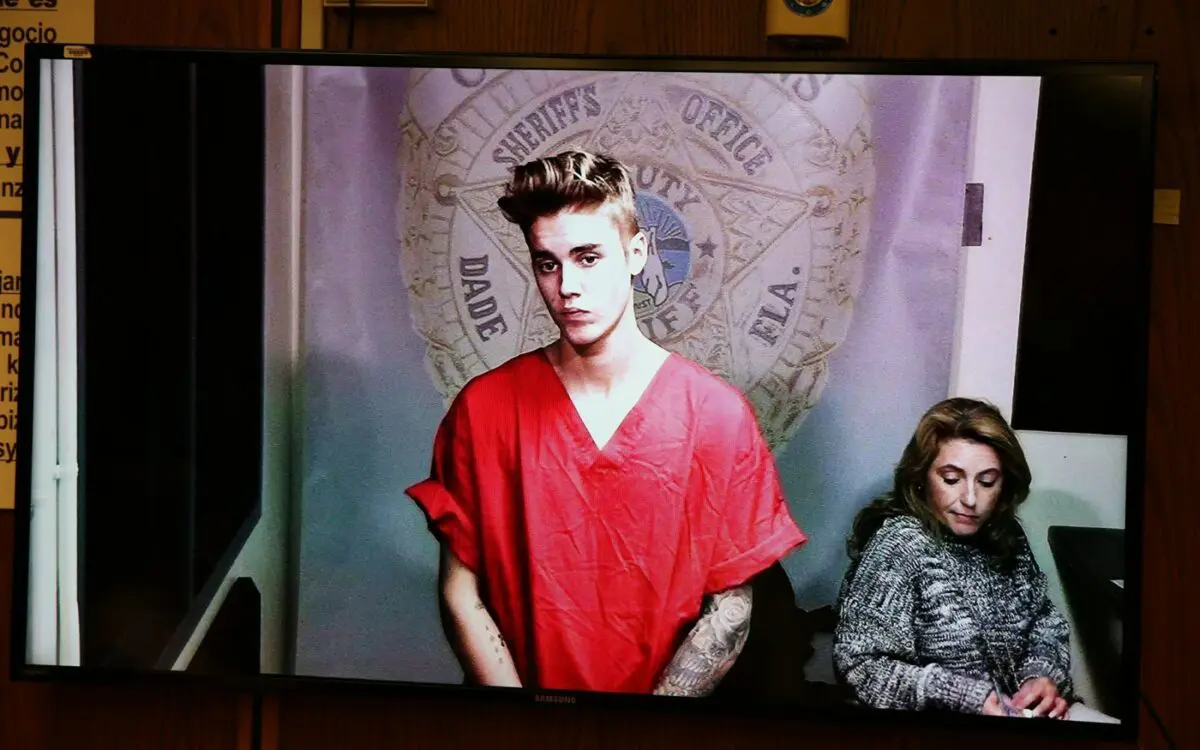In the whirlwind of celebrity life, public figures often find themselves under intense scrutiny, every action magnified and interpreted through the lenses of critics and fans alike. Recently, Justin Bieber faced backlash after being spotted smoking in front of his teenage brother, Jaxon, during Coachella. This incident has reignited discussions surrounding the misinterpretation of celebrity behavior, the pressures of public perception, and the complex interplay between mental health and fame.
Understanding the Context: Coachella and Celebrity Culture
The Coachella Valley Music and Arts Festival is more than just a music event; it is a cultural phenomenon where stars convene, share their artistry, and often, engage in behaviors that might be considered unconventional in less glamorous environments. For Justin Bieber, this festival serves as a backdrop not only for artistic expression but also as a stage where actions are dissected and discussed.

Being part of this vibrant atmosphere, Justin was seen enjoying the festivities, which naturally included some relaxation methods such as smoking. Critics seized upon this moment, accusing him of setting a poor example for his younger brother, who was also present. However, context matters. Justin’s father had brought Jaxon to witness the environment and enjoy the camaraderie that comes with such events, a clear indication that this was a familial outing rather than a reckless moment.
Reactions to Justin’s actions can be classified into several categories:
- Criticism from the Public: Many fans expressed disappointment, seeing the act through the prism of poor role modeling.
- Support from Peers: Fellow artists often stood by Bieber, emphasizing the need for personal freedom.
- Media Interpretation: Headlines often sensationalized the event, framing it as reckless behavior without considering the full picture.
The public’s fascination with celebrity culture often leads to a distorted reflection of reality, where moments are taken out of context. This is detrimental not just to the individual involved but also to broader conversations about health, family dynamics, and the pressures of living life in the spotlight.
Examining Misinterpretation in Celebrity Actions
The issue of misinterpretation goes beyond the surface level of the actions performed. In Justin’s case, smoking was not merely seen as a personal choice but was quickly transformed into a topic of debate regarding his character and responsibilities as a brother and public figure. This serves as a cautionary tale about how easily perceptions can shift based on the prevailing narratives pushed by social media and celebrity culture.
For instance, consider how an artist such as Billie Eilish has navigated similar scrutiny when discussing mental health and personal choices. Both musicians exist within a space where their actions can lead to public outcry or sympathy, yet, the crux of the issue often lies in the interpretation of their choices.
Justin’s recent experiences echo those of many artists who battle with mental health issues while under constant public observation. The discourse surrounding smoking in this context becomes a metaphor for the many layers of stigma and scrutiny that encompass mental health in celebrity culture. Insights into psychological well-being demonstrate that actions such as smoking can serve as means of coping with the pressures experienced by public figures.
Criticism and Mental Health: The Heavy Burden of Public Image
As Justin navigates his ongoing challenges with mental health, the recent criticism surrounding his actions brings to light the burden of maintaining a public image. It is essential to explore how such scrutiny can impact the mental well-being of celebrities.

The intersection between public criticism and mental health issues often results in a never-ending cycle of self-doubt and the pressure to conform. The expectations placed on celebrities like Justin can be overwhelming, leading them to seek relief through various outlets, sometimes leading to actions that are misunderstood. In this specific case, smoking was taken not as a personal choice but as evidence of a potentially destructive lifestyle.
It’s crucial to recognize several key factors:
- Public Scrutiny: Constant media coverage and commentary can exacerbate mental health struggles.
- Lack of Understanding: Audiences may not grasp the complexities of celebrity life, leading to misinterpretation of their actions.
- Support Systems: Celebrities often rely on their family and friends to navigate these turbulent waters, which can create tension.
The discussions surrounding Justin’s smoking habits are indicative of a broader societal trend where individuals feel compelled to navigate their choices under the watchful eyes of the public. This extends to conversations about substance use, where public figures often fear being labeled for actions that many people engage in away from the limelight.
The Role of Friends and Family
In Justin’s case, the presence of family members like Jaxon and his father at Coachella should have been viewed positively, framing the situation as a familial bonding experience rather than a moment of irresponsibility. The source cited that Justin’s father brought Jaxon to share in the joy of the festival after witnessing the fun that his son had experienced during the first weekend. Such acts could have been a constructive way of showcasing the bond rather than punctuating it with criticism.
Moreover, the support from his wife, Hailey, reveals the personal stakes in public discussions about mental health and well-being. While some sources reported concerns regarding their relationship amid the scrutiny, Hailey’s steadfastness demonstrates the importance of stable relationships in high-pressure environments. She represents a vital support structure as they navigate the complexities of fame together.
Social Media’s Role in Shaping Public Perception
Social media platforms have drastically transformed the landscape of celebrity interaction. For Justin Bieber, platforms such as Instagram and Twitter have been double-edged swords, granting him a direct line to his fans while also exposing him to immediate backlash. After the Coachella incident, social media erupted with comments both supporting and criticizing his actions.

The rapid spread of information, often without necessary context, leads to a challenge in deciphering what is real and what is sensationalized. Here are some critical roles that social media plays in shaping public perception:
- Amplification of Voices: Fans and critics alike utilize social media to share their views, creating a cacophony of opinions.
- Instant Feedback: Public figures receive immediate reactions to their actions, accelerating the cycle of controversy.
- Misinformation: False narratives can quickly spread, leading to reputational harm.
In Justin’s case, as he experienced public criticism for smoking, supporters rallied around him defending his right to enjoy himself without judgment. This illustrates the dualities present in social media discussions, where supportive communities can revolutionize the mental health narrative, while concurrent critiques can threaten artists’ well-being.
Navigating the Pressure: Strategies for Celebrities
Given the intense scrutiny, public figures might adopt strategies to cope with ongoing pressure, promoting mental and emotional resilience. These might include:
- Limiting Social Media Exposure: Reducing the time spent on platforms where negative comments proliferate can help protect mental space.
- Engaging with Supportive Networks: Maintaining strong connections with trusted friends and family can provide grounding.
- Professional Help: Seeking assistance from mental health professionals to manage the effects of pressure and scrutiny.
Ultimately, the most effective strategies should prioritize psychological health while navigating the complexities of public life. Justin Bieber’s recent experiences illustrate the nuanced landscape where personal choices can transcend the boundaries of celebrity culture, leading to widespread misinterpretation of intentions and actions.
Moving Forward: A Culture of Compassion
As society continues to engage with celebrities, the need for a culture of compassion becomes increasingly paramount. Justin Bieber’s story is a reminder of the duality present in today’s celebrity landscape: public figures are entitled to their personal lives and choices, even in potentially questionable moments. The hope is that through conversations surrounding criticism, mental health, and the need for understanding, fans can foster a more empathetic approach as they engage with their icons.
The call for compassion resonates deeply within the current cultural climate, where celebrities such as Justin play pivotal roles in the conversations surrounding vulnerability, authenticity, and the burdens borne under public visibility. By understanding the intricacies of celebrity culture and its impact on personal lives, there exists an opportunity for collective growth, emphasizing the necessity of patience and support amidst a landscape often rife with judgment.
As artists like Justin continue to share their journeys, the hope is to cultivate conversations that inspire understanding and openness on the topics that matter most. Public actions, such as smoking in a festive environment, need to be viewed through a lens that acknowledges the complexities of mental health and personal choice, sparking dialogues that could truly transform celebrity culture for the better.
I’m Mikael, a 35-year-old Gossip Gravity Creator. I’m passionate about curating captivating content that sparks conversations and ignites curiosity. Join me on this exciting journey as we explore the fascinating world of gossip and trends together!



